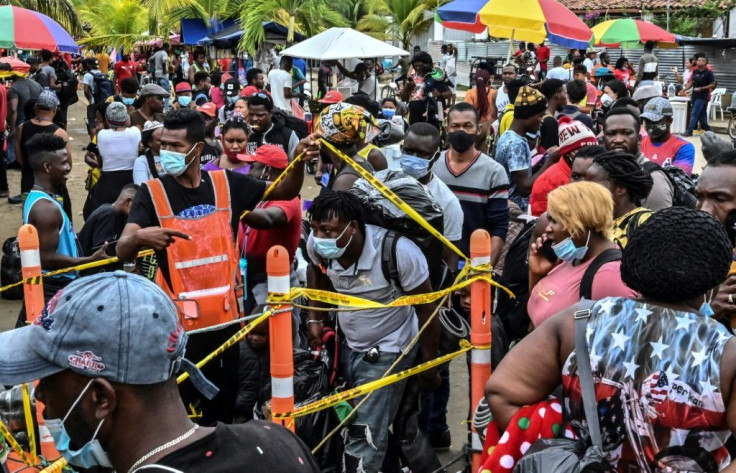19,000 Migrants Amassed In Colombia Near Panama Border: Official
Some 19,000 migrants, mainly Haitians, are amassed on the north coast of Colombia, from where they hope to cross to Panama and find a route to the United States, an official in Bogota said Wednesday.
Some have been stranded for weeks in the coastal town of Necocli in the northwestern Antioquia department, waiting for seats on boats that cross the Gulf of Uraba by boat to Acandi, which borders Panama.
There are only 250 boat tickets available every day, said Colombia's human rights ombudsman Carlos Camargo.
He reported that a mission "evaluating the migrant crisis" at Necocli -- a village of 45,000 people -- counted some 19,000 undocumented migrants there.
Most were Haitians, Camargo said on Twitter.
Haitians form a significant portion of the tens of thousands of migrants who have arrived at the border between Mexico and the United States in recent months, posing a headache for US President Joe Biden's administration.
Waiting out the bottleneck in Colombia, migrants rent private rooms or homes or camp on the beach, depending on their means.
Some 11,500 people have bought tickets to make the boat trip by October 13, and a further unknown number of people unable to purchase tickets have resorted to other forms of "illegal" crossings," said Camargo.
Once across, the migrants start, on foot, the dangerous trek from Acandi through the Darien jungle, where they battle snakes, steep ravines, swollen rivers, tropical downpours and criminals often linked to drug trafficking.

In a recent report, Doctors Without Borders (known by its French acronym MSF) said criminal gangs in the jungle prey on migrants, and assaults and rapes are common.
Under an agreement between the governments of Colombia and Panama, no more than 650 migrants are allowed to make the trip daily.
More than 50,000 people have crossed the border Colombia-Panama border so far this year.
Once in Panama, MSF reported last month, migrants are held for processing and deportation.
Those with pending administrative or judicial processes -- refugee applications, for example, or giving testimony against human traffickers -- can be held at a migrant reception center for weeks or months.
"The centers are a source of complaints, as those who are held there face inadequate food and shelter, a lack of clean water and showers, and no means to communicate with their families," MSF said.
The Colombia-Panama border is a key crossing for migrants hoping to make a new life in the United States, often fleeing poverty and violence in their home countries.
Last year, a steady influx of migrants from Colombia northward dried up due to coronavirus travel restrictions and border closures.
But officials say there have been several thousand new arrivals at Necocli in recent weeks.
© Copyright AFP {{Year}}. All rights reserved.





















